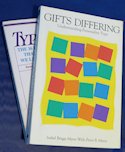
- About the MBTI
- Verify Your MBTI Type
- Personality Patterns
- MBTI Articles & Resources
- Article Directory for Educators & Students
- Books on Personality Types
- Emotional Intelligence & Personality Type
- Career Planning & MBTI
- MBTI Business Applications
- Lenore Thomson - Carl Jung Personality Type
- Site Map - Master Directory of All Articles
- MBTI Consultant Links
- Personality Type Workshops & Conferences
- Links to Other Type Websites
- Murder Mystery Business Theatre
- About Us
Understanding the MBTI ® and Personality Type
Emotional Intelligence & Personality Type
An exploration of Emotions, Feeling & Emotional Intelligence - Part 2
By Ross Reinhold, INTJ
Article Index
Page 1. Emotional Intelligence
Page 2. EI, EQ & MBTI Type
Page 3. Emotion, Feeling, Thinking & Personality Type
Page 4. Feeling + Thinking
Book Review: "The Parasitic Mind: How Infectious Ideas are Killing Common Sense" - The Civil War between Feeling and Thinking?
How is Emotional Intelligence different from IQ Intelligence?
For some, the pairing of the words "emotional" and "intelligence" come close to being a non sequitur. Intelligence (or IQ) is a mostly stable, innate ability that is a characteristic of the higher level cognitive mind; whereas emotion arises from the non-cognitive, primitive part of the brain . . . and can be easily influenced and triggered by experience. Emotion happens; it seemingly arises from within our bodies . . . not from our minds.
In reading Goleman, it becomes clear he is talking about some important knowledge and skills that contrast sharply with aspects of what folks would term rational decision making and have some relationship to emotion.
Goleman’s descriptions (and others’ rendering of Goleman) seem to suggest Emotional Intelligence is closely related to Jung-Myers Feeling preference. As an example, look at some extracts of Goleman's book "Emotional Intelligence" by one Goleman disciple, Educator Brian Lamb (emphasis mine) :
“Knowing something is right ‘in your heart’ is somehow a deeper kind of certainty than thinking it with your rational mind . . . .”
“Ordinarily there is a balance between the rational and emotional minds but each, as we shall see, are semi-independent faculties. . . .”
“Boys take pride in tough independence while girls see themselves as part of a connected web. Thus in conversation men tend to talk about “things” while women seek emotional connections. . . .”
“A study of 250 executives found that most felt their work demanded their heads but not their ‘hearts’. Many said that feeling empathy for co-workers would conflict with their organisational goals. They believed emotional aloofness was needed to make the hard decisions that business requires. . . .”
Those conversant with Myers-Briggs concepts might well see the above statements as juxtaposing “Feeling” vs “Thinking” - the dichotomy of Judgment.
The parallel with Jung-Myers Feeling is further strengthened by the underlying values of Emotional Intelligence; the skills and behaviors espoused by EI advocates mirror the value constellation of Feeling Preference people. Witness how one writer, education professor Leslie Owen Wilson, describes Goleman’s measure of emotional intelligence (EQ . . . for Emotional Quotient):
“EQ is not destiny - emotional intelligence is a different way of being smart. It includes knowing your feelings and using them to make good decisions; managing your feelings well; motivating yourself with zeal and persistence; maintaining hope in the face of frustration; exhibiting empathy and compassion; interacting smoothly; and managing your relationships effectively. Those emotional skills matter immensely - in marriage and families, in career and the workplace, for health and contentment.”
EI and Emotional Intelligence fails to measure preference for Feeling
While at first blush, Feeling judgment seems to be what EI is about, those who have studied the connection more closely believe that skillfully executing these desired behaviors depends on effective use of both Thinking and Feeling . . . and for that matter also effective use of Sensing and Intuition.
In a the recent issue of the Bulletin for Psychological Type (Vol. 29, No.3 2006), one of the authors, Henry “Dick” Thompson (2006, p. 18), reported on some of his research into EI and Type. One finding I found quite interesting was that of the 5 personality types with the highest overall EQ score, three preferred Feeling and two preferred Thinking. In fact the top 2 were ENTJ and ESTJ ! (followed by ENFJ, ESFP, and ENFP). Of the 5 personality types with the lowest overall EQ score, three were Feeling types and two were Thinking types. And surprisingly, the bottom two were Feeling types: ISFJ and INFP! People looking for a correlation between EQ and Feeling won’t find it in Thompson’s research! About the only conclusion Thompson seemed willing to risk from this study was it appears that the EQ measures have a bias towards Extraversion.
Another authority of Personality Type, Elizabeth Murphy (2006, p. 26), reported on a study that found a correlation between dominant Intuition and high EI scores. Murphy noted that this same study, like Thompson's, found no relationship between EI and Feeling. In noting some of the unexplainable EI relationship to Type, Murphy offered the following advice: “. . . if someone is working with you and they offer suggestions or strategies for practicing any of the EQ skills that do not have a good fit for your style, check with someone who shares your type to see if they have any insight into an effective system that will work for you. The outcome of self-awareness, self-management, social awareness, and relationship management is available to all types. How you attain that level of success is unique to your type.”
In the third article in the recent Bulletin on Psychological Type, Roger Pearman reported on his studies of Emotional Intelligence and Personality Type (pp. 20-24). Pearman has used a measure of EI developed by Mayer, Salovey, and Caruso called the MESCEIT. Both the model and the instrument depart from Goleman in that the authors seek to measure cognitive abilities rather than skills or behaviors. Pearman has found a strong theoretical correlation between the 8 components of Mayer’s model and the 8 components one gets when Jung’s four mental functions are differentiated by extraversion and introversion (extraverted sensing, introverted sensing, extraverted feeling, introverted feeling, etc.). So Pearman believes the healthy use of emotion is related to effective use of all the mental functions rather than being uniquely associated with Feeling.
(Note: Pearman and his associates currently use a measure of EI called the BarOn EQ, which has "twenty five years of research behind it.")
From my review of the literature, it seems clear EI is not Feeling. Although Goleman frequently contrasts EI with rational thinking, his measures of this competence, the EQ inventory score and sub scores, suggest that EI is not antagonistic to Thinking judgment. I think it fair to conclude that without constructive use of our Thinking mental function, with its detachment from emotion, broad-based EI competence would be difficult to attain.
 Next Page: Thinking, Feeling, and Personality Type and How they relate to Emotions
Next Page: Thinking, Feeling, and Personality Type and How they relate to Emotions
While we have noted that the measures of EI show scant correlation to the Feeling function, both EI and Feeling share some connection with “emotion.” . . . read more
![]() Book Review: "The Parasitic Mind: How Infectious Ideas are Killing Common Sense" - The Civil War between Feeling and Thinking?
Book Review: "The Parasitic Mind: How Infectious Ideas are Killing Common Sense" - The Civil War between Feeling and Thinking?
Other Popular or New Articles on Personality Type
![]() Mobile Friendly Version of our Free Personality Type Test
Mobile Friendly Version of our Free Personality Type Test
The Civil War between Feeling and Thinking

Trump - The Mouth that Roared Once Too Often?

® MBTI, Myers-Briggs, Meyers Briggs, and Myers-Briggs Type Indicator are registered trademarks or trademarks of the Myers-Briggs Type Indicator Trust in the United States and other countries (aka meyers briggs or myers briggs).
Return to Myers Briggs, Personality Types, & MBTI Applications Home Page
© Published by Ross Reinhold & Reinhold Development 1997 - 2023
Privacy Policy About Us


